 | "Lord High Chamberlain"
"Chiaus Passi"

Commander of the çavus corps, which was responsible for discipline and protocol in the Imperial Council, and also served on embassies and as couriers. His sign of dignity is the
buzdygan, a mace. |
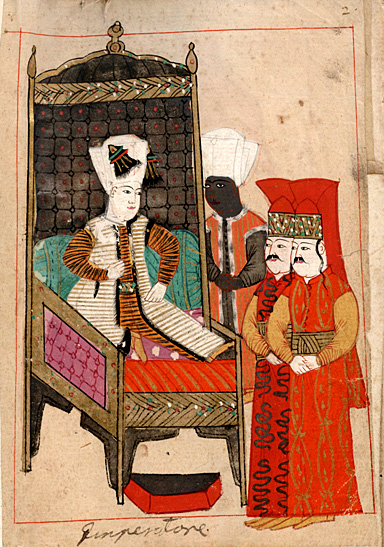 | "The Emperor"
"Imperatore" - Padishah
The 18-year-old Sultan Mehmed IV on his throne attended by a black eunuch and two pages. On his turban he carries two turned-down heron's aigrettes, sorguç. Rålamb describes him in precisely this attitude and with little flattering words. |
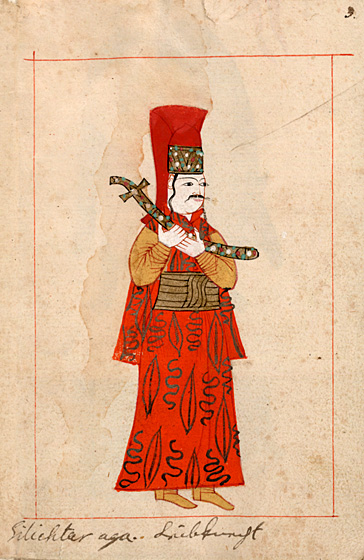 | Sword-bearer to the Sultan
"Silichtar aga. Leibknecht"
The Silahtar aga had charge of the Sultan's personal arms and commanded his personal attendants. He wears the janissary
headdress börk.
|
 | Standard bearer
"Keisarens Vexillifer"
The Turkish title is Bayrakdar.
|
 | "The Queen"
"La Regine".
Hasseki Sultan, the Sultan's favourite wife who had born him a son.
|
 | Turkish woman
"Turca" |
 | Woman in bathing pattens
called
 |
 | Turkish woman
"Turca" |
 | Court-lady smoking a pipe
"donna - Keis(erliche) dame" |
 | Woman with a vase and goblet
"Turka sentata (i.e. seduta)" |
 | "He who has false weights"
"Den som har falsk wicht"
Punishment for dishonest traders. |
 | He carries fruits to the Vizir
"förärar frucht åt viziren"
On the tray also vases with roses and tulips of the slender species wich was popular at the time. |
 | "He carries food to the people of the Serail"
"bär mat åth folket i Seraglien"
|
 |
Ayran - seller (?)
"Sellier sur miölk" - 'Selling sour milk'
|
 | Soldier carrying the head of a slain enemy to the vizir
"De som bära hufvuden till viziren af dem som de i kriget hafver ihiälslagit" |
 |
Executioner
The instrument was probably used for impaling.
|
 |
"Carries water in the Diwan"
"Bär watn i divanen"
|
 | "Wood-cutter"
"Baltagi delli desme"
The "wood-cutters" (baltici) were used for road-keeping but also as a palace guard. This figure looks rather more like a Water-carrier, sakkâ.
|
 | Barber
Water containers with taps are hanging on the horizontal beam. There is a similar scene in the album published by Taeschner.
|
 | Armenian
|
 |
Armenian woman
"Femme Armenienne"
|
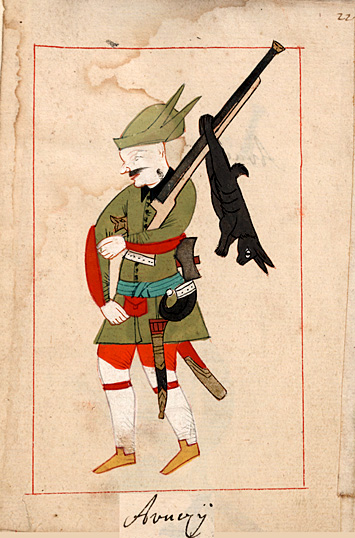 | Hunter
"Avuczij"
The hunters, Avcus, formed a special detachment within the army.
|
 | Sweeper - Lamplighter
"Boklusi Passar tienare medh Bastonen".

The Turkish word means 'street-sweeper' but the man's equipment denotes him as a lamplighter. |
 | Guard
"Baltagii"
This soldier is dressed as a Janissary with a leopard skin. |
 | Janissary
|
 | Moldavian
"Bogdan" |
 | State shepherd
"Belickhoban der som achtar Kejsarens fää"
Beylik çoban guarding the Emperor's cattle. |
 | Pasha at war
"Bassa in Guerra" |
 | The Bey of Rumelia
|
 | Commander of the Life Guard

Originally "Superintendent of the Imperial gardens" with jurisdiction over the shores and waters of the Bosphorus, also police officer responsible for the exection of high-ranking wrongdoers. |
 | Imperial "gardener" and life guard
"Bostangij"
|
 | Secretary of the "gardeners"
"Scrivano de li Båstangi"
|
 | Overseer of the conscripts
"Chiaia di Achiamoglani" - Acemioglanlar kâhyasi
Was in charge of the açemi oglans, the conscript Christian
boys who were later to become janissaries. |
 | Cook
"Coquo"
|
 | Imperial mute
"Mutus precipuus imperatoris"
The "tongueless" (dilsiz) waited on the Sultan in council
and were used for confidential commissions. |
 | Armourer
Cebeci
The janissary detachment of armourers was used for the production of weapons
and for transports but also for the discipline in the area around the Hagia
Sophia. |
 | Chief white eunuch
"Cap Agas, Isolarens commendant, snopter"

Supervisor of the palace and commander of the pages, içoglans.
|
 | Khan of the Crimean Tatars
"Tatar Han"
|
 | Burgher of Constantinople
"Civis Constant[inopolitanus]"
|
 | Chief of the Prophet's descendants
"Nakib Effendi"

The numerous corporation of Muhammed's descendants formed a kind of nobility
with the privilege of carrying green turbans.
|
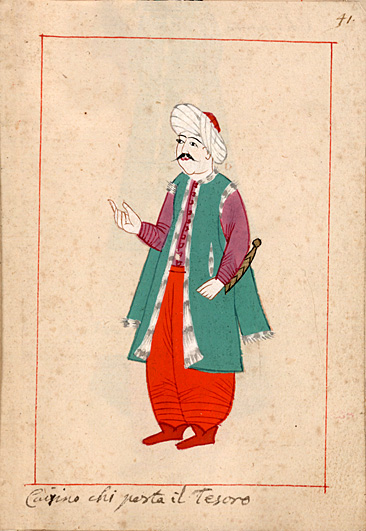 | Treasure-carrier
"Cairino chi porta il Tesoro"
Hazinedar = "Treasurer" |
 | Chief huntsman
"Öffwer Jagermester"
|
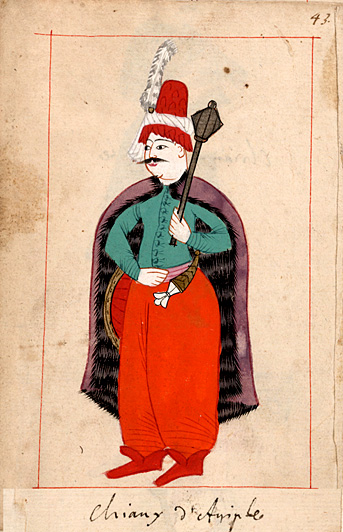 | Herald for Egypt
"Chiaus d'Agipte"
|
 | Servant and taster
"Essendrager - Czesnere"

|
 | Sultan's groom
"Sadlar K[ejsarens] hest"
Saddling the Emperor's horse. |
 | Executioner
with strangulation rope.
"Chelat - Bödeln"
|
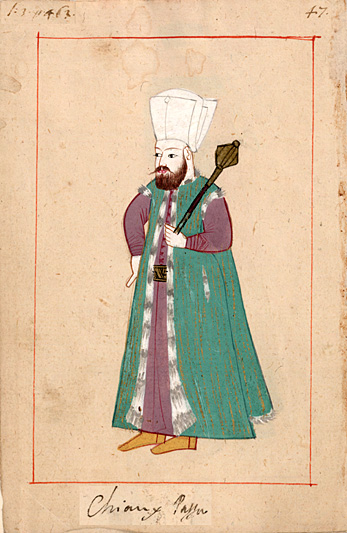 | "Lord High Chamberlain"
"Chiaus Passa"
Cf nr 1.
|
 | Sultan's taster
"Czesnerbassa qui éprouve il manger de l'Empereur".

|
 | Doorkeeper
"Capicij"
|
 | Footmen of the Grand Vizier
"Chaters 12 som gå för Viziren när han kommer
uthi Divan"
"12 footmen who go before the Vizier when he goes to the Divan"
 |
 | Chief Falconer
"Douanskij Passa öfwer Falka"
|
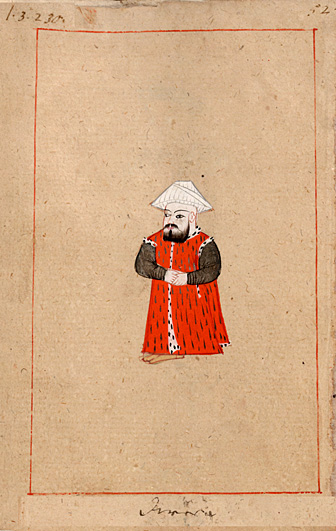 | Court dwarf
"dwärg"
Cüce |
 | Janissary Captain
"Sorbetzi. Officiale de li Janizari"
 |
 | Greek
"Graeco"
|
 | Greek girl
"Virgine grequa"
|
 | Greek woman
"femme grecque"
|
 | Janissary herald
"Chiaus de li Janizari"
|
 | Sultan's rower
"Hamlecij qui tirent les remes de la gallere de l'Empereur"
Hamlaci |
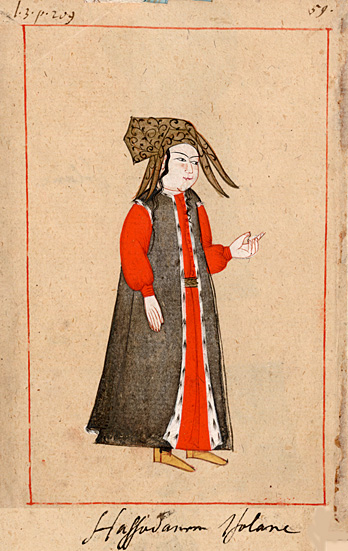 | Page of Sultan's bodyguard
"Hassodanem Isolane"
 |
 | Page
"Izolan aqildi(?)"
 |
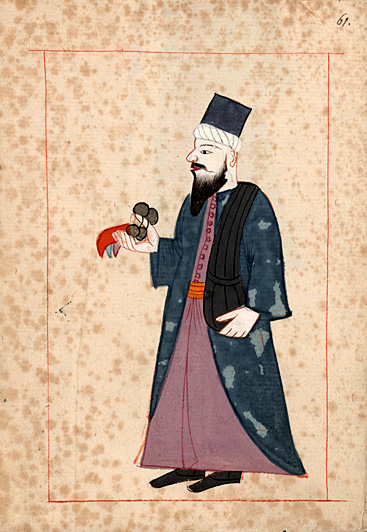 | Man in priestly dress
Holding an undetermined object (possibly castanets) in his
right hand.
|
 | Eunuch doctor of the pages
"Isolan Ekim. Castratus medicus isolanorum"
 |
 | Infantry colonel
"Ihaia Bassa qui vont au pied devant le Janissar aga"

Yaya was an infantry force from Anatolia. |
 | Bektashi dervish
"Ianissar Soffos prester som gå för ianissarer
och roopa Hu hu"

In the Sultan's procession, as described by Rålamb, were a group of
Bektashi dervishs, whose leader shouted 'God is generous' and they answered
Hû! 'He is!'. |
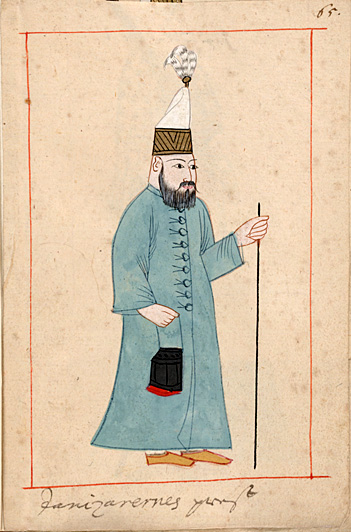 | Janissary priest
"Janizarernes prest" |
 | Janissary Nr 1
"N: 1 / den förnämste Janissar som gå näst
Ianis[sar] Aga"
|
 | Janissary
|
 | Mounted page
"Izoglan a cavallo"
The pages, iç oglans, were chosen among the most gifted of the conscript
Christian youth and could attain high positions. |
 | Janissary from Egypt
"Ianissari d'Agÿpte"
|
 | Bride
"Sponsa"
|
 | Armenian woman
|
 | Hebrew woman
|
 | Jewish woman
|
 | Jew
|
 | Janissary colonel
"Ianissars Chorbassij qvi vont ā cheval deuant Ianissar aga" |
 | Greek woman
|
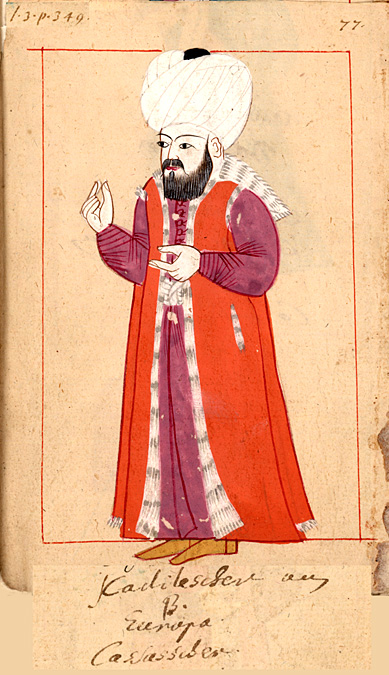 | Chief military judge for Europe
"Kadilescher d'Europe"
|
 | Greek
|
 | Harem Superintendent
"Kihaia Cadena som har upsicht medh alle slawinner"

responsible for discipline in the Harem |
 | Armenian
|
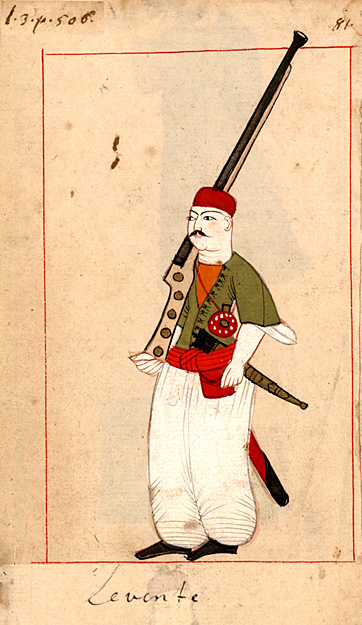 | Musketeer
"Levente"
The Levend were irregular land and sea forces, sometimes more like brigands. |
 | Trumpeter
in the Janissary music (mehtar) with a zurna
trumpet. |
 | Dancer
with castanets çalpara |
 | Zither-player
Kanûnî |
 |
Market
inspector
"pesa il pane Mustazib"
'Muhtezib weighs the bread'
carrying instruments for punishment.
|
 | Mute
The 'tongueless' (dilsiz) messengers were used for confidential commissions.
Cf nr 35. |
 | Sultan's bodyguard
"Peick qvi vanno innanzi l'Imperatore"
Peyk and solak formed the Sultan's bodyguard. |
 | Sultan's bodyguard
"Peik gå för Keisaren" - 'goes before the Emperor' |
 | Persian
|
 | Persian
|
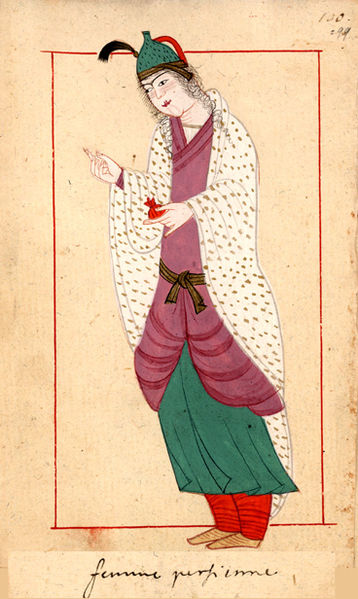 | Persian woman
|
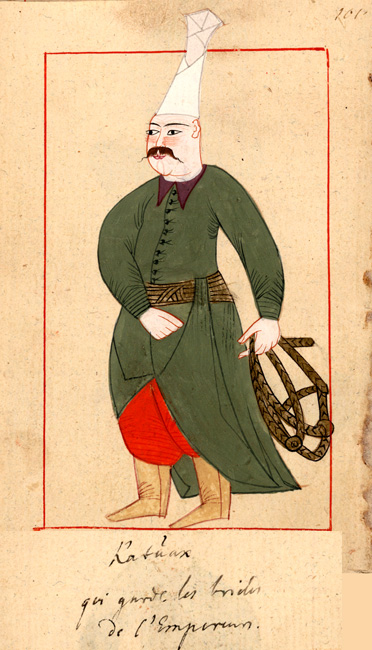 | Sultan's groom
"Ratuax(?) qui garde les brides de l'Empereur" |
 | Herald for Rumelia
"Rumeli Chiaus"
|
 | Governor, Beylerbey, of Bosnia
"Rumeli Beglerbeg de Bosnia"
|
 | Palace guard
"Sarail Beckri qui font la garde"
Saray Bekçis |
 | Dog-keeper with war-dog
"Samsongij der ser efter Leyonen"
The Samsuncu company managed the war- or hunting-dogs. The subtitle, however, says he is 'looking after the lions'. |
 | Cavalryman
Sipâhî
|
 | Cavalryman from Cairo
"Spahi di Cairo" |
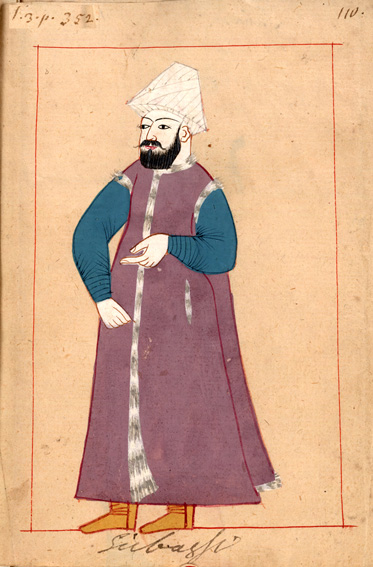 | Sheriff

A police officer at Constantinople |
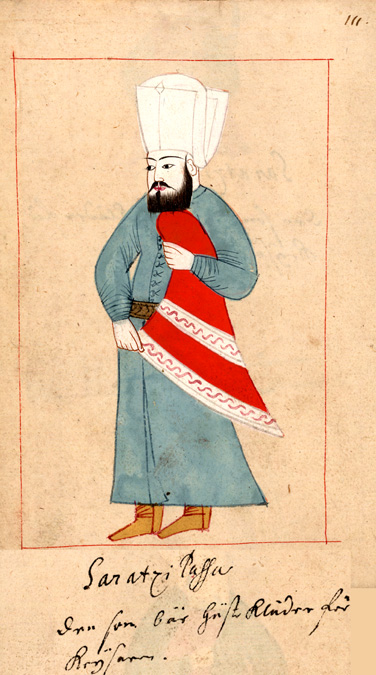 |
Sultan's saddler
"Saratzi Passa der som bär hästkläder för Keysaren"
'carrying horse clothes for the Emperor'
Serraç = saddler and groom
|
 | Archer and bodyguard, Solak
"Solak effter Keisaren" 'after the Emperor'
Solak='left-handed' |
 | Archer and bodyguard
"Solacchi" |
 |
Palace porter - hamal
"Serail Hamali - Ingen annan kommer uthi Serailen uthan der bärer der in Kläder och tapisseri."
"No one is allowed into the Serail except the one who brings clothes and tapestry"
|
 | State courier
"Tartar" |
 | Khan of the Crimean Tatars
"Tartare Han"
|
 | Artillery sergeant
Topçus
|
 |
Hungarian
"Ungarus"
|
 |
Hungarian
"Unger"
|
 | Captain of the Palace Guard
"Viziri Teffeikzij"
Vezir-i Tüfekçi |
 |
Wallachian
"Valachus"
|
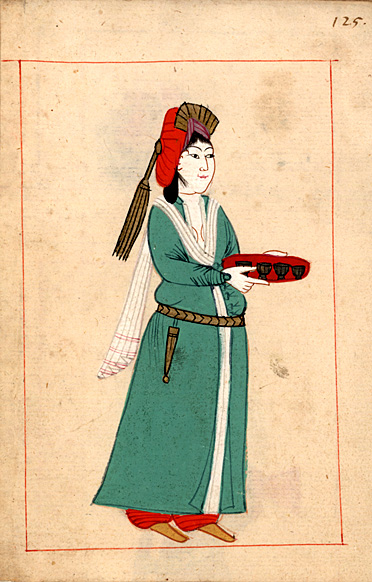 | Maidservant
|
 | Woman drummer
with a dümbelek |
 | Woman and boy
on the way to the bath (hammam). She carries a metal vessel covered with red cloth which was used for clean clothes and as a bucket in the bath. |
 | Woman with gold vessels
|
 | Dancer
with castanets
 |
 | Water carrier
"Azemoglan".
Cf nr 13. |
 | Mufti
Official expounder of Muslim law.
|
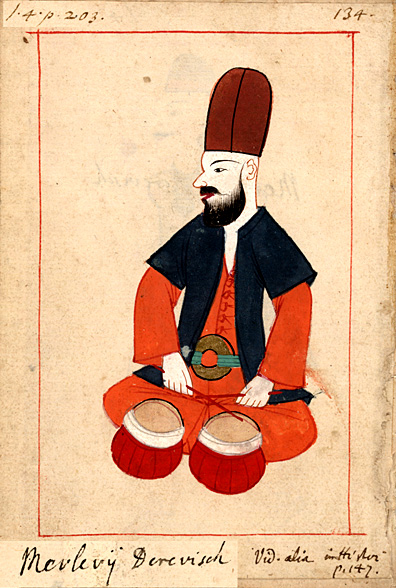 | Mevlevi dervish
playing the kudum drum used in Mevlevi music
|
 | Itinerant dervish
"Pelerin" - 'Pilgrim'
|
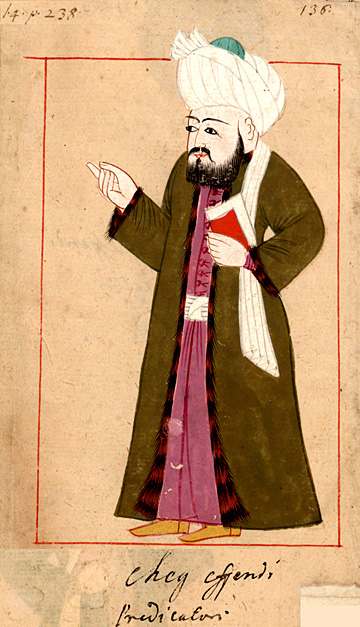 | Learned man - "Shaykh"
"Cheg effendi - Predicator"
 |
 | Persian kings etc.
1. Yezdegerd. Name of 3 Sasanid kings.
2. Abd Manaf of Qurayshi tribe, Muhammad's great-grandfather.
3. Hormoz. Name of 5 Sasanid kings. |
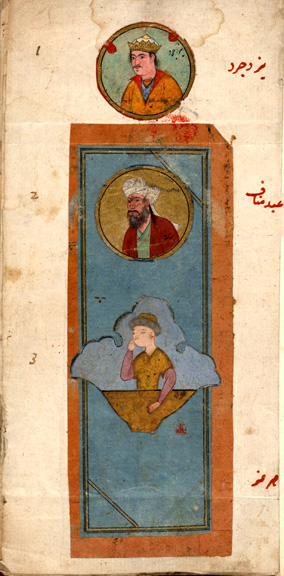 | Persian kings - Ptolemy
4. Kobad. Name of 2 Sasanid kings.
5. "Batlemyus". Astronomer Ptolemy.
6. Anoshirvan = Sasanid king Khusrau I.
|














































































































































